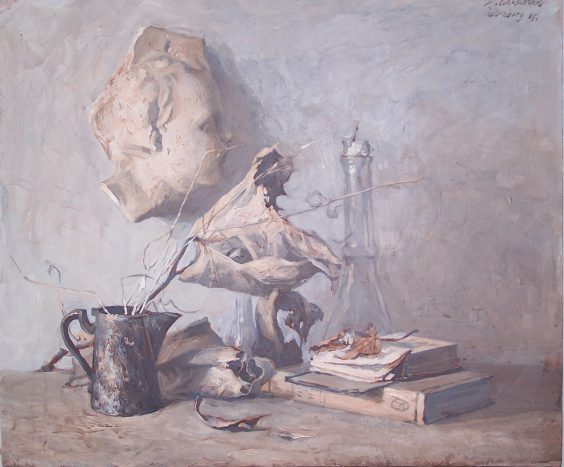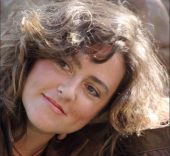A Schubert Excerpt
by Anzhelina Polonskaya and translated by Andrew Wachtel / May 23, 2016 / No comments

Image by Dmitry Evtushenko. Used with permission. Rights reserved.
Did I ask for sympathy? – Yes. I asked for a tiny thing that could change my life and, if not give me a sense of home, then at least allow me to avoid the feeling I’d lost it forever. Did I ask for darkness, exile? – No. And what answer did I get? Apathetic silence.
In the tower by the shore of the little lake music is playing. It’s almost dark and the tower looks somewhat abandoned, but I’m absolutely sure I hear the sound of a piano.
- Anzhelina Polonskaya

- Russian writer Anzhelina Polonskaya is the author of eight poetry collections and one short story collection, published between 1994 and 2013. Her work has been shortlisted for the 2005 Corneliu Popescue Prize for European Poetry in Translation, the PEN Award for Poetry in Translation, and the 2014 Best Translated Book Award. She is a member of the Moscow Union of Writers and the Russian PEN Centre. In early 2015, Anzhelina Polonskaya and her family began receiving threats after she returned to Russia from a scholarship to study in Germany. She was forced to flee the country after Russian nationalists attacked her for her poetic contribution to an oratorio requiem for the KURSK submarine disaster, a taboo subject in Russia. Anzhelina Polonskaya is the current ICORN writer-in-residence of the City of Refuge in Frankfurt, Germany.
I always feel a sense of troubled worry bordering on depression when I come upon an abandoned dwelling place. My imagination draws a picture of medieval asceticism, death, and stone as a symbol of blind, eternal life. At the same time, fear attracts me: I look around to see whether there are stairs that I could climb to look inside. Behind the windows upstairs a blue light suddenly flashes. A pocket flashlight? I see broken steps covered in slippery moss. I have to step carefully – my damaged knees won’t heal a second time. Luck is a capricious thing. Sometimes it swims right up to you – take it and do whatever you want – other times you hoard it carefully, wrap it up and nurture it, but it dies in the first puff of wind. I walk across the rickety landing to the tall windows. The paint is peeling. One shutter is partially open and in the dim light of the blinking blue beam I can see the left side of a room. A black lamp on a dresser. Or maybe I took some other kind of object to be a dresser?
Street cold and damp stone seep out. Stone which has lost its heat, left this way for many years, gives off a specific odor. The piano is still playing. When the pianist hits a false note the sound breaks off and his fingers try to find the right key.
I’m conflicted. On the one hand I want to know whose idea it was, in this abandoned tower, to bring to life an instrument that had long ago forgotten the touch of fingers. On the other, I’m afraid to find not a person but some kind of monster in a chitinous shell with dull empty eternity instead of a soul. I stand undecided and watch as the sky congeals, pulling in a flight of ducks with their voices like professional mourners. They’re flying so bravely with their necks so tautly stretched out and their hearts so small that I want to cry from unconscious ecstasy and pity for them and for me, for everything that ties us to the world and that will eventually and unavoidably rupture.
Nearby, some of the birds have fallen behind the wedge and they land in the water with a loud splash. My eyes adjust to the darkness. Going down to the path, partly covered in wet snow, I look around at the tower once again. Now it looks taller and more slender, the darkness has sliced off the unnecessary details from its sides and given it an air of grotesque solemnity. The hillside, covered in fallen leaves, no longer looks as if it is covered with rust.
Fear overcomes me.
I feel uncomfortable, as if at some point, in the midst of a crowd some poor beggar grabbed me and is hanging onto me asking for alms. She’s quiet, but I know that her shadow is everywhere, no matter where I might turn. If I slow down, she stops, but as soon as I move more quickly I feel her presence on my back. There’s simply no way to get rid of her.
She’s my antithesis.
The twilight leads me to despair.
The past year, which brought the death of a beloved person and led to a deep personal crisis, has massively upset my nerves. They’ve become like the keys of that piano – just touch them and they vibrate, giving off black and white notes.
I’ve been thinking about my mother quite a bit. About our separation. A day will come when, in the world of voices, I’ll no longer hear hers.
What will I do with that silence?
Why live through in the present that which will be in the future? I shouldn’t split, shouldn’t separate myself from her even for a minute – that’s what I should be doing, but instead I run from my house like a beggar trying to flee from poverty. I need to learn to overcome all the dances of the goat-legged satyrs not because of the accursed place that is familiarly called my homeland (“your country, right or wrong”) but because of my mother, understanding the ridiculously small amount of time we’ve been given. The future has turned into an anticipation of inevitable unhappiness. What is it? Life watering down its colors? But once upon a time I was also as colorful as those bright birds in the market.
It’s already December, the first of December comes like a deafening gunshot – winter. My legs carry me along the familiar path to where humans live. Where a light is burning on a wooden porch. The puddles have become covered with a thin layer of ice and crunch underfoot. You can hear rustling in the bushes and if you didn’t know that this is the kingdom of the squirrels you’d be overcome by a kind of mystic horror. Venus has risen, big and washed out. Over dinner I ask D., whether he was the one up in the tower. Yes, he was playing a Schubert excerpt. “I’m glad you didn’t come in. Otherwise I’d have died of fright,” he says, bringing his grateful hands together like an eastern sage.




